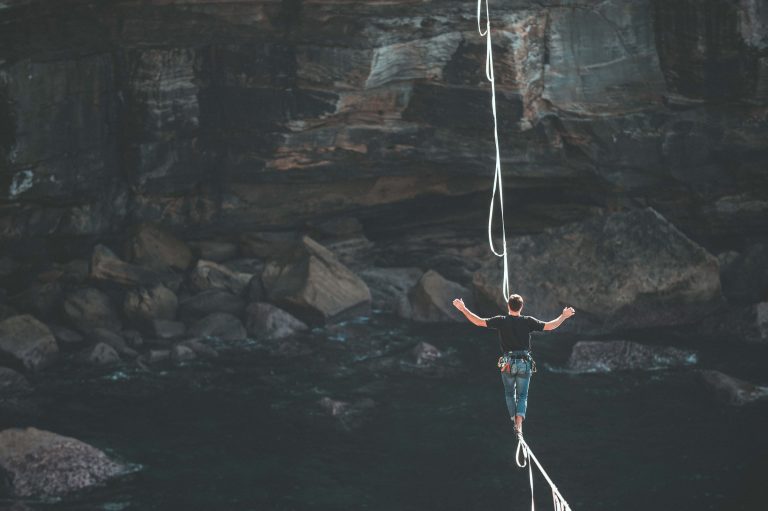Risk-taking is proven to be linked to courageous action – here are 20 leaders who took risks to make a positive impact.
As we discovered in our recent academic study on courage, risk-taking (connected with altruism) is directly connected with courage.
Over 1,000+ people took the study, rating themselves on various personality traits related to courage and answering questions on work scenarios that might require courageous action.
Even those who did not self-identify as a risk-taker in general as a personality trait, when asked questions about workplace scenarios involving ethical dilemmas requiring courage, demonstrated they would take a risk to act courageously to stand up for others or for what was right.
In a world where it feels like humans are against each other so often, what a beautiful finding that we as humans are our most courageous selves when we’re advocating for other people or the greater good.
Choosing 20 inspiring leaders
While the world is far from perfect, there has been enormous positive change brought about by many leaders. We can learn from and be inspired by their courage in the face of modern challenges.
And even if we aren’t activists or inventors trying to save the world, we can display courage in our daily lives, whether making a difficult decision at work or having a brave conversation with a family member. Even putting our own self-care needs first is courageous at times.
While the situations these leaders faced varied in intensity, the common theme is that they broke stereotypes, worked to raise the voices of the unheard, or attempted to protect the unprotected. They all took a risk for the greater good, often not seeing the effects of their actions in their lifetimes.
We reviewed nearly a hundred lists of courageous prolific people across many countries, genres (politics to medicine), genders, and ages. We chose people who took sometimes life-threatening risks to take an altruistic stand, to protect the unprotected, and to promote an “all ships rise together” agenda for generations to come.
These twenty remarkable individuals faced massive resistance and fear, but for the greater good, they did it anyway.
20 courageous risk-takers
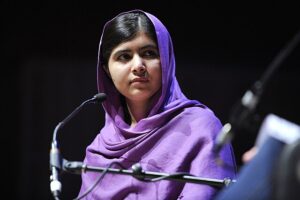
Malala Yousafzai
Malala Yousafzai’s courage became internationally known when she was shot by the Taliban in 2012 for advocating girls’ education in Pakistan, where girls were banned from school. Despite facing life-threatening threats and violence, she continued to take a stand for others’ whose voices were not currently being heard. She continued her efforts to empower girls through education, and her recovery and continued activism have inspired the world, making her an icon for the fight for girls’ rights and education.
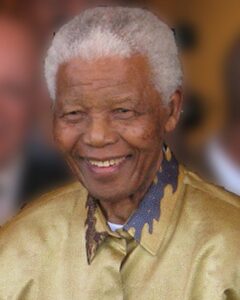
Nelson Mandela
Nelson Mandela’s 27 years of imprisonment for his anti-apartheid activism is a testament to his unwavering courage for the well-being and rights of others. He emerged from prison as a symbol of reconciliation, steering South Africa from the brink of civil war toward a brighter, unified future.
Be Courageous founder and CEO Kyle Hermans was a lucky student to have been present in South Africa during Mandela’s speech after his release. Kyle remembers, “I will never forget the fire it started in me as a young student to strive always to live a courageous life.”
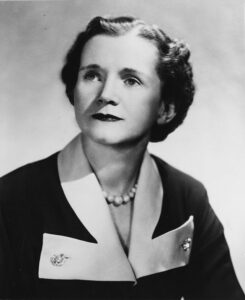 Rachel Carson
Rachel Carson
The release of Rachel Carson’s book “Silent Spring” in the 1960s reshaped our understanding of environmental issues. She took risks by speaking out against financially and politically powerful organizations (as a woman in a male-dominated field), exposing the harmful effects of pesticides, leading to the modern environmental movement and the eventual ban of DDT in the United States.
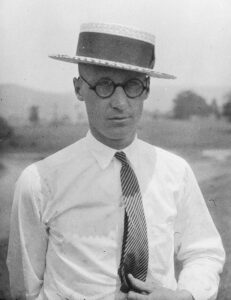
John Scopes
In 1925, high school teacher John Scopes risked his career and reputation when he taught the theory of evolution in his classroom, an illegal act in Tennessee. His trial, famously portrayed in “Inherit the Wind,” challenged prevailing creationist beliefs. Convicted, his case sparked important discussions about the separation of church and state and what is taught in American classrooms. Scopes faced the outcome of imprisonment to bring a major discovery of science to the world.

Greta Thunberg
Greta Thunberg’s decision to strike from school to demand action on climate change catapulted her to the forefront of global environmental advocacy. Her courage inspired millions of young activists worldwide to stand up and demand climate action from their leaders. Now, the world is united on Sustainable Development Goals (SDGs) to lessen human impact on the earth and create better conditions for future generations.
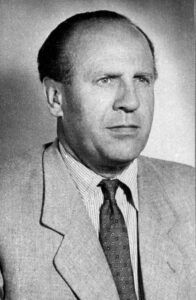
Oskar Schindler
Oskar Schindler was a businessman who used his enamelware and ammunition factory in Nazi-occupied Poland to save over 1,200 Jewish workers during the Holocaust. He risked his life by offering shelter, food, and protection to preserve the lives of the innocent. Schindler is a brave symbol of hope and resistance during one of the darkest periods of human history.
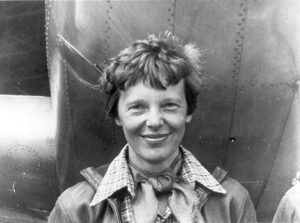
Amelia Earhart
Amelia Earhart’s determination to break gender barriers in aviation led her to become the first woman to fly solo across the Atlantic. During a time when flying itself was a risky proposition, her pioneering spirit inspired women worldwide to pursue careers in aviation and begin to see themselves in other mainly male-dominated roles.
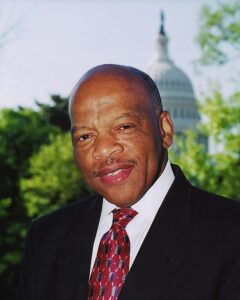
John Lewis
John Lewis experienced numerous physical assaults and arrests while participating in civil rights demonstrations, including the historic Selma to Montgomery march in 1965. His bravery and advocacy for racial equality helped shape the Civil Rights Act of 1964 and the Voting Rights Act of 1965, which had a profound impact on dismantling racial segregation and discrimination. Throughout his life, he remained dedicated to fighting for justice and equality, inspiring future generations to follow his path of peaceful resistance and activism.
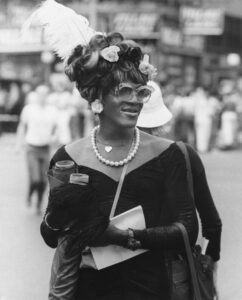
Marsha P. Johnson
Marsha P. Johnson played a pivotal role in the early LGBTQ+ rights movement. As a Black transgender woman, she was a prominent figure at the historic Stonewall Inn riots in 1969, a catalyst for the modern LGBTQ+ rights movement. Johnson faced stigma, homelessness, and personal danger while demanding the right to live authentically for herself and her peers. She co-founded the Gay Liberation Front and the Street Transvestite Action Revolutionaries (STAR), organizations dedicated to supporting marginalized transgender and LGBTQ+ individuals. Her unwavering activism and visibility challenged societal norms and stereotypes about gender and sexual orientation.
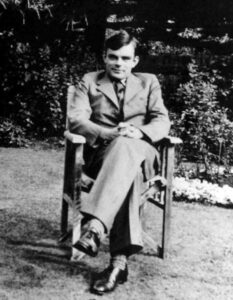
Alan Turing
Turing faced the possibility of severe legal consequences and imprisonment as a brilliant mathematician and computer scientist who played a pivotal role in breaking the Enigma code during World War II. In isolating conditions, his unorthodox work with early computers and code-breaking was highly risky and secretive. But when the code was cracked, it contributed to ending the war. In his personal life, he faced discrimination and persecution including “chemical castration” due to his homosexuality. Pardoned after his tragic death, the “Alan Turing law” protected future men from enduring the same criminalization.
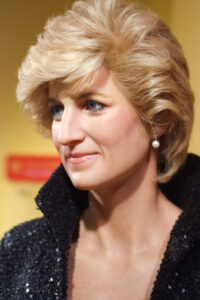
Diana, Princess of Wales
Princess Diana displayed extraordinary courage through her involvement in the AIDS movement. In the 1980s, there was significant stigma and misinformation surrounding the disease. She faced estrangement from the royal family by doing things her way, and her advocacy helped reduce the social stigma associated with HIV/AIDS and paved the way for improved awareness, treatment, and research.
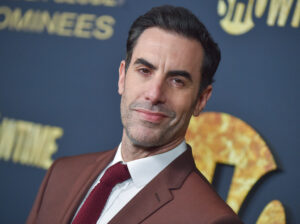
Sacha Baron Cohen
A courageous risk-taker in comedy, Cohen has created multiple personas (i.e., Borat, Ali G) to expose racism, sexism, and prejudice. While some say his humor is offensive, raunchy, and inappropriate, when listening to his speeches at Harvard and the ADL (Anti-Defamation League), one sees an eloquent thinker whose edgy comedy is intended to expose the problems in humanity in an effort to make it better.
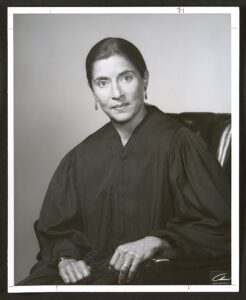
Ruth Bader Ginsburg
Ruth Bader Ginsburg’s courageous journey was marked by her tireless advocacy for gender equality and women’s rights, facing enormous resistance. At times, the only woman serving as a Supreme Court Justice, she played a pivotal role in shaping legal precedents that advanced equality, demonstrating a steadfast commitment to justice until the last days of her life at age 87.
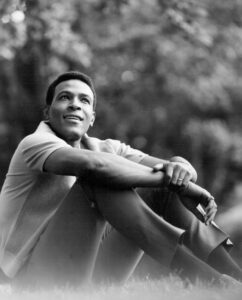
Marvin Gaye
Motown, and in particular, its founder, Berry Gordy, was not pleased with the political content of Gaye’s album, “What’s Goin On” when first recorded. Partially inspired by witnessing his brother serve in Vietnam, the songs on the album are told from the point of view of a black soldier returning home from fighting in a “white man’s war.” Motown did not want their artists making political statements or defying “the Motown sound.” But with persistence and passion, Gaye didn’t give up. He stopped recording any songs for Motown until Gordy gave in and released the song “What’s Going On” in 1971. Gaye used his art to shed light on stories not elsewhere heard in the news.
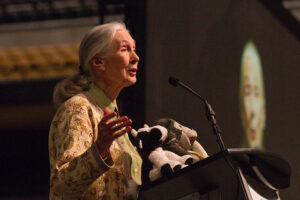
Jane Goodall
Dr. Jane Goodall’s pioneering work with chimpanzees in Tanzania revolutionized our understanding of primates and conservation. Challenging gender norms in a male-dominated field, and also with no scientific training, her groundbreaking research profoundly impacted efforts to protect endangered species and their habitats. Goodall faced dangerous conditions and isolation living in the wild to fulfill her purpose.
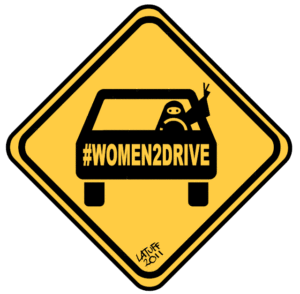
Saudi Arabian Women Drivers
Saudi Arabian women (including Manal al-Sharif, Loujain al-Hathloul, Aziza Youssef, and Eman al-Nafjan) all risked dangerous consequences for bravely standing up for the right for women to drive in Saudia Arabia. Their collective actions likely played a pivotal role in lifting the ban on female drivers in Saudi Arabia in 2018.
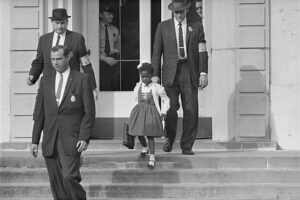
Ruby Bridges and Mrs. Barbara Henry
Ruby Bridges, at age six, was one of the first African-American students to attend an all-white school in the racially segregated South during the 1960s. She faced daily threats, harassment, and discrimination from angry segregationists, yet she continued to walk through the doors of William Frantz Elementary School with unwavering determination. Only one teacher was willing to instruct her. Mrs. Barbara Henry experienced immense hostility and threats from segregationists. Despite the dangers and societal backlash, she remained committed to her principles and believed every child deserved an equal education. Mrs. Henry not only helped Ruby integrate William Frantz Elementary School but also played a pivotal role in the larger civil rights movement, demonstrating exceptional bravery and unwavering dedication to equality and justice. Ruby said of her teacher, “I had never seen a white teacher before, but Mrs. Henry was the nicest teacher I ever had. She tried very hard to keep my mind off what was going on outside.”
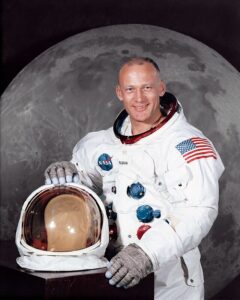
Buzz Aldrin
Fearlessly embarked on a journey to the moon as part of the Apollo 11 mission, with full knowledge of the immense risks and uncertainties associated with space exploration. Stepping onto the lunar surface alongside Neil Armstrong, he demonstrated exceptional bravery in the face of the unknown, risking his life for the sake of scientific discovery and human progress. Aldrin’s willingness to push the boundaries of human exploration and his determination to reach new frontiers in space make him a true pioneer and a symbol of courage in the annals of astronaut history.
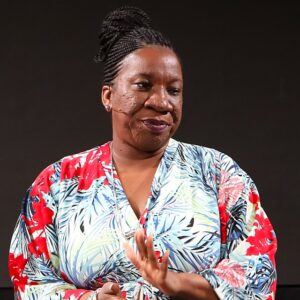
Tarana Burke
Tarana Burke’s courageous decision to create the “Me Too” movement and empower survivors of sexual assault has sparked a global conversation about the pervasive nature of harassment and assault. Opening up about the most vulnerable situations, her advocacy paved the way for countless individuals to share their stories and demand change.
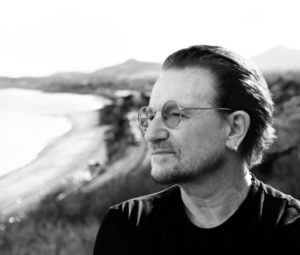
Bono
Whether a fan of U2’s music or not, Bono has consistently used his platform to champion social and humanitarian causes around the world. His dedication to addressing issues such as poverty, disease, and social injustice through music and activism demonstrates his commitment to making a positive impact. He has engaged with world leaders, spoken out against injustice, and pushed for change.
What is worth you taking a risk to make the world a better place?
Even though it feels like the incredible humans above are in a different league than those of us who spend our days at work and raising families and not out there on picket lines or risking our lives, the truth is that the people above are just that: People. The same as you and me.
We are all faced with decisions daily that we can either act on from a place of courage or a place of fear.
These individuals, and so many more, show us that courage, coupled with a vision for positive change, can truly transform the world. Their risk-taking endeavors have left an indelible mark on humanity and our planet, reminding us that we, too, have the power to make a difference. As we navigate the challenges of our time, let their stories inspire us to be courageous, to take risks, and to work towards a brighter and more sustainable future for all.
Even if you don’t consider yourself a risk-taker, consider the lengths you’d go to for your family or friends. We all have courage inside of us, we just have to activate it. Practice activating your “courage muscle” and make courage a habit in your life. And reach out if you need help with where to start in yourself, your team, or your company!
Contributors to this piece: Shannon Geher, Kyle Hermans, Glenn Geher, Jenna Hermans, Andrew Geher, Sophia Guyton, and FIN (research).
